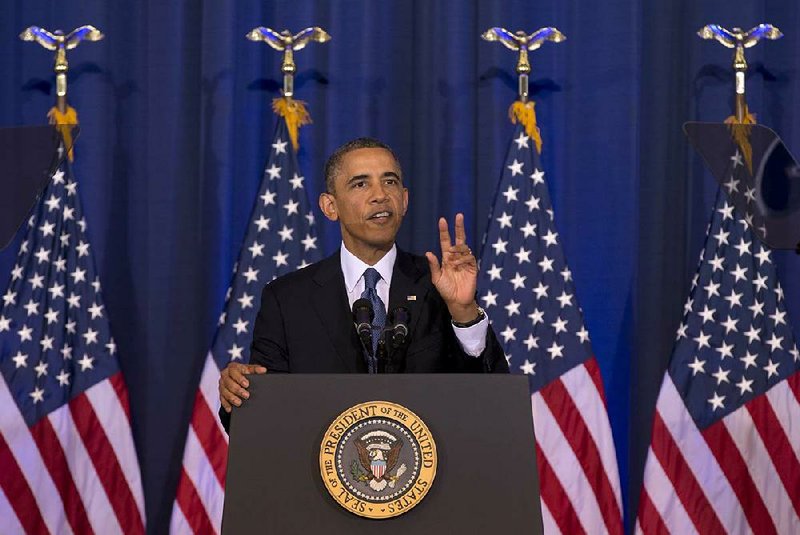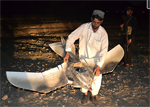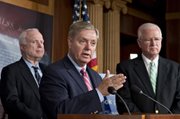WASHINGTON - President Barack Obama on Thursday announced new restraints on targeted killings and narrowed the scope of the long struggle with terrorists as part of a transition to a day he envisions when the nation will no longer be on the war footing it has been on since the attacks of Sept. 11, 2001.
In a speech at the National Defense University, Obama offered his most expansive defense of the drone war that he has waged since taking office, but he signaled that he planned to wind down the strikes, which have stirred anger at home and abroad.
He imposed a higher standard on authorizing such aerial attacks and shifted responsibility more from the CIA to the military, and he suggested the creation of a secret court that would have to sign off on strikes in the future.
Obama also called on Congress to revise the authorization of force that it passed in the aftermath of 9/11 to reflect the changing nature of the war on terrorism. And he renewed his effort to close the prison at Guantanamo Bay, Cuba, by saying that he would lift a moratorium on transferring scores of detainees to Yemen.
The president’s plan would move the country away from the perpetual war on terrorism envisioned by former President George W. Bush and toward a more limited campaign against particular groups that would eventually be curtailed even if the threat of terrorism could never be eliminated.
“Our systematic effort to dismantle terrorist organizations must continue,” Obama said. “But this war, like all wars, must end. That’s what history advises. That’s what our democracy demands.”
Obama rejected the notion of an expansive war on terrorism and instead articulated a narrower understanding of the mission for the U.S.
“Beyond Afghanistan, we must define our effort not as a boundless ‘global war on terror’ but rather as a series of persistent, targeted efforts to dismantle specific networks of violent extremists that threaten America,” he said.
“Neither I, nor any president, can promise the total defeat of terror,” Obama added. “We will never erase the evil that lies in the hearts of some human beings, nor stamp out every danger to our open society. But what we can do - what we must do - is dismantle networks that pose a direct danger to us, and make it less likely for new groups to gain a foothold, all the while maintaining the freedoms and ideals that we defend.”
The president’s moves stirred immediate skepticism among Republicans, who have long questioned whether he was playing down the continuing threat of terrorism for political reasons, as in the case of the attack on the diplomatic post in Benghazi, Libya, last year.
Sen. Saxby Chambliss, R-Ga., the top Republican on the Intelligence Committee, reacted to a preview of the remarks before the president spoke.
“The president’s speech today will be viewed by terrorists as a victory,” he said. “Rather than continuing successful counter terrorism activities, we are changing course with no clear operational benefit.”
Some on the left were disappointed that he did not go further or that it had taken him so long to recommit to closing the Guantanamo Bay lockup. Medea Benjamin, a co-founder of the activist group Code Pink, interrupted Obama’s speech, shouting that he should release Guantanamo detainees, stop CIA drone strikes and apologize to Muslims for killing so many of them.
“Abide by the rule of law!” she yelled as security personnel removed her from the auditorium. “You’re a constitutional lawyer!”
Obama then went off script. “The voice of that woman is worth paying attention to,” he said. “Obviously I do not agree with much of what she said. And obviously she wasn’t listening to me and much of what I said. But these are tough issues. And the suggestion that we can gloss over them is wrong.”
As part of its shift in approach, the administration on Wednesday formally acknowledged for the first time that it had killed four U.S. citizens in drone strikes outside the battlefields of Afghanistan and Iraq, arguing that its actions were justified by the danger to the United States. Obama also approved providing new information to Congress and the public about the rules governing his attacks on al-Qaida and its allies.
New classified policy guidelines signed by Obama will sharply curtail the instances when unmanned aircraft can be used to attack in places where the United States is not at war, countries like Pakistan, Yemen and Somalia. The rules will impose the same standard for strikes on foreign enemies that are used for U.S. citizens deemed to be terrorists.
Lethal force will be used only against targets who pose “a continuing, imminent threat to Americans” and cannot feasibly be captured, Attorney General Eric Holder said in a letter to Congress, suggesting that threats to a partner like Afghanistan or Yemen alone would not be enough to justify being targeted.
The president cast the drone program as crucial in a counter terror effort that will rely less on the widespread deployment of U.S. troops as the war in Afghanistan winds down. But he acknowledged that the targeted strikes are no “cure-all” and said he is deeply troubled by the civilians unintentionally killed.
“For me, and those in my chain of command, these deaths will haunt us as long as we live,” he said. Before any strike, he said, “there must be near certainty that no civilians will be killed or injured - the highest standard we can set.”
The CIA, which has overseen the drone war in the tribal areas of Pakistan and elsewhere, will generally cede its role to the military after a six-month transition period as forces draw down in Afghanistan, other officials said Wednesday. Drone strikes have already been decreasing in the past few years as targets have been killed and opposition has grown.
John Brennan, the new CIA director, has been eager to shift the agency more toward espionage, intelligence-gathering and analysis, and away from the paramilitary mission it has adopted since 9/11.
But according to an unclassified summary of the guidelines, the CIA will continue to work with the military on the program in Yemen, and control it in Pakistan, given the concern that al-Qaida may return in greater numbers as U.S. troops leave Afghanistan.
The military and the CIA currently work side by side in Yemen, with the CIA flying its drones over the northern region out of a covert base in Saudi Arabia and the military flying its unmanned aerial vehicles from Djibouti.
Though Obama sought to give more transparency to the drone program, the strikes will largely remain highly secret from the public. Congress has been briefed on every strike that U.S. drones have made outside Afghanistan and Iraq, Obama said, but those briefings are largely classified and held privately.
The president had been planning to deliver the national defense speech for months to address criticism from both left and right, hoping to acknowledge more explicitly than ever before the complicated tradeoffs and legitimate debate that his policies had provoked, aides said. But he hoped to make the case that his drone strikes had caused far fewer civilian casualties than traditional and less discriminate military force.
The president embraced the idea of a secret court to oversee drone strikes, like the intelligence court that authorizes secret wiretaps or an independent body within the executive branch. He did not outline a specific proposal, but left it to Congress to consider something along those lines.
He also weighed in on the dispute over the Justice Department’s seizure of journalists’ phone and e-mail records in pursuing national security leak investigations. He said he had talked with Holder, who agreed to review department guidelines, and meet with media executives and report back by July 12.
The seizure of records from The Associated Press is part of an investigation into who leaked information to AP reporters for a May 7, 2012, story that disclosed details of a foiled plot in Yemen to bomb a U.S.-bound airliner, around the anniversary of the May 2, 2011, killing of then-al-Qaida leader Osama bin Laden.
AP President and Chief Executive Officer Gary Pruitt has called the Justice Department’s actions “unconstitutional,” and he has protested what he termed an unprecedented intrusion into how news organizations go about gathering the news.
Pruitt said the seizure already has had a chilling effect on news-gathering.
“I am troubled by the possibility that leak investigations may chill the investigative journalism that holds government accountable,” Obama said Thursday. “Journalists should not be at legal risk for doing their jobs.”
But he said his administration would continue to try to find the government employees who are responsible for leaks.
In renewing his vow to close the Guantanamo prison, Obama highlighted one of his most prominent unkept promises. He took office promising to shutter the facility within a year, but Congress moved to block him, and he then largely dropped the effort.
With 166 detainees still at the prison, Obama said he would take what steps he could with his own authority to reduce the population there. The largest group of detainees remaining is from Yemen, and he decided to lift the moratorium he imposed on transferring those prisoners back to their home countries.
The moratorium was first enacted because of the volatile nature of the government in Yemen and the fear that prisoners would be released and rejoin terrorist groups targeting the U.S. But with a new president in Yemen, Abdu Rabbu Mansour Hadi, one White House official said the United States now “has a willing and increasingly able partner,” and so the president felt assured enough to resume transfers.
Obama also said he will appoint a new high-level State Department official to replace Dan Fried, who oversaw the effort to reduce the Guantanamo prison population in the first term, and the president will assign a top official at the Defense Department to work toward the goal.
Republicans reacted cautiously, saying Obama had not been serious about proposing a credible alternative to Guantanamo.
“I am open to a proposal from the president regarding Guantanamo Bay, but that plan has to consist of more than political talking points,” said Rep.Howard “Buck” McKeon, R-Calif., the chairman of the House Armed Services Committee. “The president doesn’t need to remind Americans that Guantanamo is an imperfect solution, we all know that. He must offer solid answers about what he thinks is a better option.” Information for this article was contributed by Peter Baker of The New York Times; and by Mark Sherman, Julie Pace, Lara Jakes, Lolita C. Baldor, Kimberly Dozier and Richard Lardner of The Associated Press.
Front Section, Pages 1 on 05/24/2013



